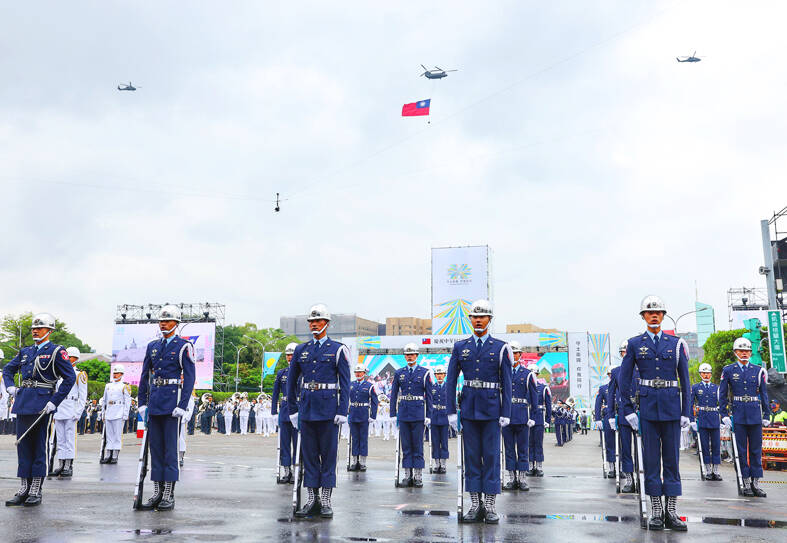The military reforms announced by President Tsai Ing-wen (蔡英文) on Tuesday are aimed at freeing up active-duty troops to focus on combat preparedness missions and boosting the ability of reserve forces to back them up, a military expert said.
Han Gan-ming (韓岡明), a research fellow at the government-funded Institute for National Defense and Security Research (INDSR), said on Tuesday that the plan announced by Tsai clearly delineates the main tasks of Taiwan’s voluntary, compulsory, reserve and civil defense units.
Under the proposed reforms, Taiwan’s voluntary force, which constitutes the backbone of its armed forces, would be responsible for defending the country’s territory, airspace and surrounding waters.

Photo: CNA
Conscripts serving their mandatory one-year-service and reservists would be responsible for handling homeland defense, and guarding military posts and key infrastructure, while serving as a backup force, the plan states.
Civil defense units would be mainly responsible for playing a supportive role in the event of war and assisting with disaster relief efforts during times of peace.
Homeland defense is at present mainly the responsibility of reservists, said Han, a retired one-star general from the army who lead the Ministry of Defense’s All-out Defense Mobilization Office from 2016 to last year.
The problem with that is that reservists need longer to ensure they are combat ready before such a mission, as they would only be called up to serve in a unit in the event of war, Han said.
By extending compulsory military service to one year, conscripts would be more capable and able to adapt more quickly to homeland defense roles alongside reservists, he said.
This would also enable the voluntary forces, the backbone of the military, to focus entirely on defending Taiwan’s territory, he said.
The current four-month conscription period is too short to produce enough corporals, lieutenants and second lieutenants to meet the nation’s military needs, Han said.
They are critical elements of combat units and responsible for training reservists and conscripts, but other experts have also said that there might not be enough of them to handle important missions and additional training demands under the new system.
Han estimated that within three to five years of the launch of the new system in 2024, the armed forces would have more qualified corporals, lieutenants and second lieutenants who could take up key roles as reservists responsible for homeland defense missions.
Tsai also promised to increase the monthly salary of conscripts, from NT$6,510 to NT$20,320, plus NT$5,987 provided by the army to cover meals and insurance, to ensure they have enough to cover basic daily expenses.
The military is a mainly volunteer force, with conscripts serving a supporting role. The total number of troops is about 215,000. As of last year, there were 160,000 voluntary military personnel.
Chieh Chung (揭仲), an associate research fellow with the National Policy Foundation in Taipei, said that the extension of compulsory military service should give Taiwan’s armed forces an extra 60,000 to 70,000 troops starting in 2027.

Three Taiwanese airlines have prohibited passengers from packing Bluetooth earbuds and their charger cases in checked luggage. EVA Air and Uni Air said that Bluetooth earbuds and charger cases are categorized as portable electronic devices, which should be switched off if they are placed in checked luggage based on international aviation safety regulations. They must not be in standby or sleep mode. However, as charging would continue when earbuds are placed in the charger cases, which would contravene international aviation regulations, their cases must be carried as hand luggage, they said. Tigerair Taiwan said that earbud charger cases are equipped

Foreign travelers entering Taiwan on a short layover via Taiwan Taoyuan International Airport are receiving NT$600 gift vouchers from yesterday, the Tourism Administration said, adding that it hopes the incentive would boost tourism consumption at the airport. The program, which allows travelers holding non-Taiwan passports who enter the country during a layover of up to 24 hours to claim a voucher, aims to promote attractions at the airport, the agency said in a statement on Friday. To participate, travelers must sign up on the campaign Web site, the agency said. They can then present their passport and boarding pass for their connecting international

Taiwan sweltered through its hottest October on record, the Central Weather Administration (CWA) said yesterday, the latest in a string of global temperature records. The main island endured its highest average temperature since 1950, CWA forecaster Liu Pei-teng said. Temperatures the world over have soared in recent years as human-induced climate change contributes to ever more erratic weather patterns. Taiwan’s average temperature was 27.381°C as of Thursday, Liu said. Liu said the average could slip 0.1°C by the end of yesterday, but it would still be higher than the previous record of 27.009°C in 2016. "The temperature only started lowering around Oct. 18 or 19

WEATHER Typhoon forming: CWA A tropical depression is expected to form into a typhoon as early as today, the Central Weather Administration (CWA) said yesterday, adding that the storm’s path remains uncertain. Before the weekend, it would move toward the Philippines, the agency said. Some time around Monday next week, it might reach a turning point, either veering north toward waters east of Taiwan or continuing westward across the Philippines, the CWA said. Meanwhile, the eye of Typhoon Kalmaegi was 1,310km south-southeast of Oluanpi (鵝鑾鼻), Taiwan’s southernmost point, as of 2am yesterday, it said. The storm is forecast to move through central